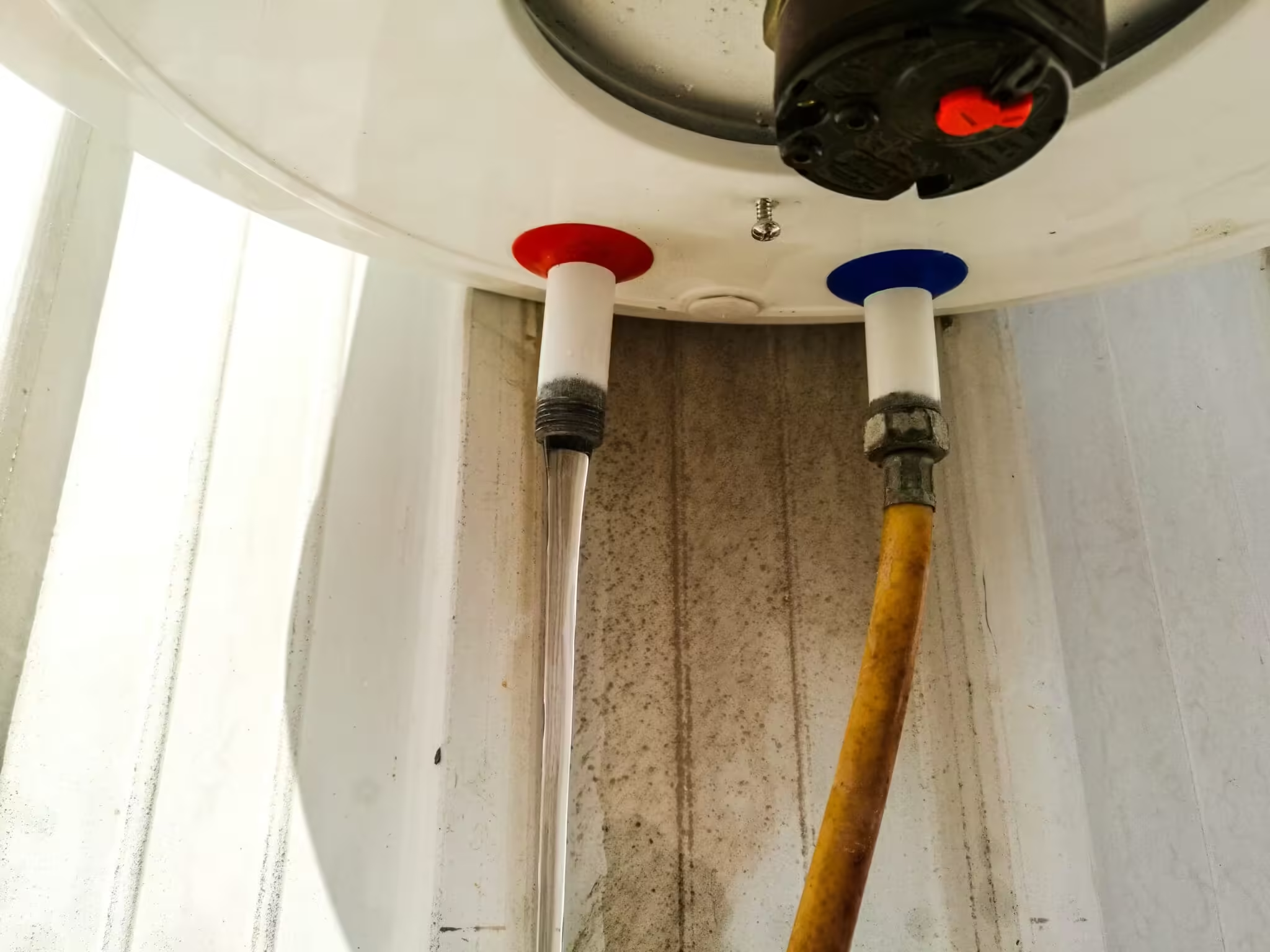How to Handle a Leaking Hot Water Tank: Causes, Solutions and Safety Tips
Leaking Hot Water Tank, A leaking hot water tank can be more than just an inconvenience, it can lead to significant damage if not addressed promptly. Whether you have a traditional tank-style or a modern tankless water heater, understanding the causes and solutions for leaks is crucial for maintaining a safe and functional home. In this guide, we’ll explore the common causes of water heater leaks, provide actionable tips for fixing them, and answer frequently asked questions to help you navigate this issue effectively. (Hot water tank leaking from Bottom)

Understanding Water Heater Leaks
Water heaters are essential appliances in our homes, providing a steady supply of hot water for various needs. However, leaks can develop over time due to several reasons. Identifying the source of the leak is the first step in preventing further damage and ensuring a quick resolution. (Hot water tank leaking from Bottom)
Common Causes of Water Heater Leaks (Leaking Hot Water Tank)
- Old Tank As water heaters age, they are prone to deterioration and corrosion. The constant heating and cooling cycles can strain the tank, leading to leaks or cracks. If your water heater is over a decade old, it might be time for a replacement.
- Loose Drain Valve The drain valve is used to empty the tank during maintenance. If not properly closed or if it becomes loose, it can lead to leaks. Regularly check and tighten the drain valve to prevent this issue.
- High Water Pressure Water heaters are designed to operate within a specific pressure range. Excessively high water pressure can cause the tank and components to work harder, leading to leaks. Installing a pressure-reducing valve can help manage water pressure and reduce the risk of leaks.
- Faulty T&P Valve The temperature and pressure (T&P) relief valve is a crucial safety feature that prevents the tank from exploding by releasing excess pressure. If the T&P valve fails or becomes faulty, it may start leaking. Regular inspections can ensure the valve is functioning properly.
- Crack in the Water Heater Cracks can develop due to manufacturing defects or physical damage. These cracks can worsen over time due to heating cycles, eventually leading to leaks. Replacing the unit is often the best solution if cracks are found.
- Hard Water Hard water contains high levels of minerals like magnesium and calcium, which can form sediment at the bottom of the tank. This sediment can cause overheating and damage to the tank. Regular flushing of the tank can help mitigate sediment buildup.
- Inlet and Outlet Connections Leaks can also originate from loose or corroded inlet and outlet connections. Regular inspections and maintenance of these connections can prevent leaks.
- Anode Rod The anode rod helps protect the tank from corrosion. If the rod becomes too worn, it can lead to rusting and leaks. Checking and replacing the anode rod as needed can prolong the life of your water heater.

Where Do the Leaks Come From?
Leaks can occur at various points in your water heater. Understanding these common leak sources can help in troubleshooting and addressing the problem effectively: (leaking water tank)
To Repair the Tank You can contact here.
- Bottom Leaks: Often caused by sediment buildup in the tank, leading to damage and decreased efficiency. Regularly flushing the tank can help prevent these leaks.
- Top Leaks: Typically due to issues with inlet or outlet connections or a faulty T&P valve. Inspect and tighten these connections regularly to prevent leaks.
- Condensation: Can be mistaken for a leak, especially in humid areas or when cold water enters a warm tank. Ensuring proper ventilation and maintaining consistent water temperature can help reduce condensation.
- Leaks Inside the Tank: Harder to detect and usually indicate severe corrosion or damage. This often requires replacing the water heater. (Leaking Hot Water Tank)

Preventing Water Heater Leaks
Preventative measures can significantly reduce the risk of water heater leaks:
- Regular Inspections: Check your water heater regularly for signs of corrosion, rust, or leaks. Early detection can prevent larger issues.
- Drain and Clean the Tank: Remove sediment buildup by draining and cleaning the tank once or twice a year.
- Professional Maintenance: Schedule annual maintenance with a professional to ensure all components are functioning correctly.
- Tighten Loose Parts: Regularly inspect and tighten fittings, connections, and valves. (hot water tank bottom leaking)
Frequently Asked Questions
| Question | Answer |
|---|---|
| Is a leaking water heater dangerous? | Yes, a leaking water heater can be dangerous as it may cause significant water damage and, in some cases, lead to electrical hazards. |
| Electric water tank leaking from bottom | This could be an issue with the drain valve. Ensure the valve is properly closed and inspect for any damage. |
| Tankless water tank leaking from bottom | Leaks in tankless heaters can be due to clogs, corrosion, issues with the temperature and pressure relief valve, inlet and outlet connection problems, or old age. |
| Can I take a shower if my water heater is leaking? | Yes, you can take a shower if your water heater is leaking, but this depends on the severity of the leak and whether hot water is still available. |
| Will a leaking water heater explode? | Yes, a leaking water heater can explode if the leak leads to a build-up of pressure or if there is a significant malfunction in the tank. |
| Temporary fix for leaking hot water heater | Attach a hose to the drain valve and direct it to a safe drainage area. Open the valve to allow water to flow out. |
| Water heater leaking from top | This may be due to loose connections, a faulty valve, or corrosion. Inspect and tighten connections and check the valve. |
| Hot water heater leaking from bottom how long will it last? | If the leak is not addressed, it might last about one more week before causing more significant issues or failure. |

Conclusion
Addressing a leaking water heater promptly is crucial for preventing damage and maintaining a safe home environment. By understanding the common causes of leaks, regularly inspecting your unit, and performing necessary maintenance, you can ensure your water heater operates efficiently and effectively. (Leaking Hot Water Tank)
For more information on maintaining and repairing your water heater, check out our blog here. If you need professional assistance, don’t hesitate to contact our experts for reliable and timely service.
Read Our Other Articles also.







